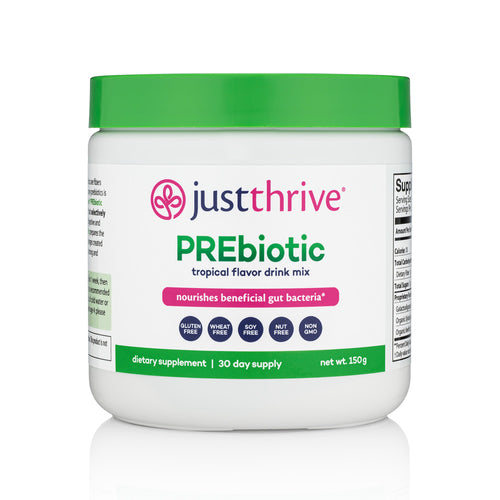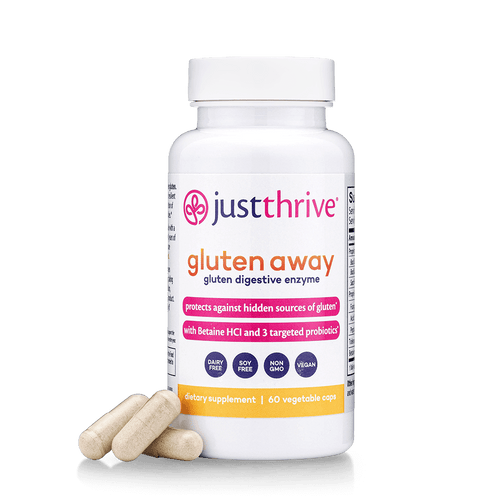YES… but not in the way you think.
Your allergy experience defines your life.
Maybe you’re sidelined by congestion, wheezing, and knockdown headaches whenever allergy season comes around.
Or you suddenly can’t breathe because your kids came home covered in cat hair.
Or you have to avoid restaurants because you might accidentally get exposed to milk, eggs, or shellfish and end up in the ER.
If you’ve been suffering with allergies, you know the symptoms can be unbearable. You’ve probably tried OTC and prescription medications, but they may have left you feeling jittery, tired, or cloudy. And while they may have reduced some of your symptoms, your allergies definitely aren’t better or gone.
But there is a way to get ahead of this problem, stopping allergy aggravations before they start. And the answer lies in a very unlikely place… Keep reading to find out how you can find relief from allergies and start feeling your best.
Allergies Have Reached Epidemic Levels
If it seems like you suddenly have allergies—or more allergies—that you didn’t have before, you’re not alone. Allergies are on the rise in adults and kids all around the world.[1,2] In the U.S., 33% of adults and 25% of children have at least one allergy.[3]
And food allergies are increasing at an especially alarming rate, leading scientists to worry that they’re reaching epidemic levels.[4]
One study[5] found that at least 10.8% of American adults—around 26 million people—have food allergies. That’s much higher than expected, and what’s more:
- 51% of them had experienced a severe reaction
- 39% had ended up in the ER
- 45% were allergic to multiple foods
- 48% first developed food allergies as adults
And if you’re one of the people suffering with allergies, you’ll try almost anything to make them stop.

Sidelined by Allergy Symptoms
Whether you’re dealing with seasonal allergies, food allergies, or allergic asthma, it takes a huge toll on your quality of life.
Seasonal allergy symptoms can last for months and range from congestion to hives to wheezing to itchy skin.
With asthma, common symptoms include your chest getting tight, wheezing, and coughing. It gets harder to breathe, like you can’t get enough air no matter what.
Food allergies happen quickly and strike hard, resulting in symptoms like:
- Hives
- Itchiness inside your mouth
- Wheezing or trouble breathing
- Dizziness
- Fainting
- Stomach pain, diarrhea, or vomiting
- Swollen lips, tongue, face, and throat
Sometimes these symptoms are mild and clear up pretty fast, but other times food allergies can be life threatening.
And while the different allergy types may seem unconnected, they have something crucial in common: Your immune system is overreacting. So to calm things down and fix that problem, you’ll need to help your immune system stay in control.
The Wrong Reaction
Your immune system protects you against all sorts of invaders from infectious bacteria to viruses to toxins. It has a whole army of cells and organs that defend you so you don’t get sick all the time.
But when you have allergies, your immune system treats harmless things—like grass, cats, and eggs—as deadly threats. So it mounts intensive defense reactions to deal with those threats and ends up attacking you instead.
Rather than just covering up your allergy symptoms, what you really want is to get to the root of the problem: an improper immune response.
And the first critical step in calming your immune system is fortifying your mucosal gut barrier.
Your Mucosal Gut Barrier Protects Against Allergies
Did you know that around 80% of your immune system lives in your gut? So it makes sense that the most important fix for your allergies starts there.[6]
Your gut’s first line of defense is the mucosal gut barrier, a thick layer of protective mucus.[7] That mucus decides which molecules get through and which get blocked out. The molecules you need—like vitamins and antioxidants—are very small, and the mucosal barrier lets them sail right through. Bigger molecules like toxins, allergens, and harmful bacteria can’t get through—at least not when everything is working the way it’s supposed to.
Unfortunately, some harmful bacteria and toxins know exactly how to weaken your mucosal gut barrier. And they want to break through, so they attack it constantly.
When your mucosal gut barrier gets damaged in those attacks, the bigger molecules can pass through to your bloodstream. That’s called leaky gut[8]… and it’s been directly linked with increasing allergies and allergy symptoms.

Leaky Gut Can Lead to Allergies
With leaky gut, allergens and partially digested food particles can sneak into your circulation. That triggers inflammation all throughout your body, amping up your immune system and setting off allergic reactions.[9,10]
At the same time, those escaped allergens directly stimulate your immune system[11], causing even more trouble.
Leaky gut has been directly linked to:[12,13,14]
- Asthma
- Eczema
- Food allergies
- Seasonal allergies
Natural medicine practitioners often focus on treating leaky gut to stop the “allergic cascade.”[15]
And one of the most effective ways to keep that from happening is to address your leaky gut by providing more support to the protective barrier.
How to Support Your Mucosal Gut Barrier
If you want to make it as easy as possible for your immune system to function properly, you need to start with your mucosal gut barrier.
That starts with making sure there’s plenty of thick, gel-like mucus to coat it. To create lush mucus, you need to start with a protective protein called MUC2 (or Mucin 2).[16] Your body uses a combination of four key amino acids to build enough MUC2 to keep that mucosal gut barrier in great shape:[17]
- L-proline
- L-serine
- L-cysteine
- L-threonine
At the same time, you want to ensure that mucus can stand up to free radicals, which can cause significant damage to the gut barrier.[18] That job calls for antioxidants, free radicals’ worst enemy.
Another great support for your mucosal gut barrier are citrus polyphenols. These unique plant compounds have been shown to promote healthy gut barrier function and balanced inflammatory responses.[19,20]
All of that support can keep your mucosal gut barrier strong and selective… but it works best in connection with a healthy, well-balanced gut microbiome.
The Dysbiosis Factor
Your gut microbiome contains trillions of bacteria, both beneficial probiotics and harmful pathogens. In a healthy gut, probiotics vastly outnumber pathogens. But sometimes, that ratio flips and your microbiome gets overrun by pathogens—a condition called dysbiosis.
And since your immune system has a direct connection with your gut microbiome, dysbiosis can contribute to all sorts of immune issues, including allergic reactions. Research shows that dysbiosis can actually cause allergies to develop, setting you up for a lifetime of struggle.[21,22]
Plus, rogue pathogens and the toxins they produce attack the mucosal gut barrier[23], cranking allergy issues up to eleven.
Luckily, you can balance your gut microbiome with high quality spore probiotics. These powerful probiotics clear a path for a diverse population of beneficial gut bacteria and help keep your mucosal gut barrier in great shape.
Support Your Gut for Healthy Balanced Immunity with Gut 4-tify
When you struggle with allergies, any day without symptoms is like a gift from your immune system. And your immune system relies heavily on your gut—both your gut microbiome and the protective mucosal gut barrier—to do its job properly.
You can support your immune system by focusing on your gut, supplying your microbiome and your mucosal barrier with the supplies they need to excel at their jobs.
Gut 4-tify provides the daily support your mucosal gut barrier needs to stay strong and vigilant:
- 4 key amino acids to support healthy production of MUC2:
- L-proline
- L-serine
- L-cysteine
- L-threonine
- A powerful antioxidant blend to help manage free radicals
- A natural citrus polyphenol extract that supports optimal gut barrier function
Just Thrive Probiotic delivers a healthy supply of four clinically studied spore probiotics to keep your gut microbiome in healthy balance. Just Thrive Probiotic also helps support a strong, resilient mucosal gut barrier.
>> Let Gut 4-tify and Just Thrive Probiotic work together to keep your mucosal gut barrier at peak performance, so you can enjoy every day in the best health.
Not sure about trying Just Thrive Probiotic or Gut 4-tify? We can help with that!
EVERY Just Thrive purchase is covered by our Bottom of the Bottle, 100% money back guarantee.
So you can try Just Thrive Probiotic and Gut 4-tify to see if they work for you… and we’re betting you’ll notice a positive difference.
But if for any reason you’re not completely satisfied, simply ask for a full product refund at any time. Even if it’s been 3 months… or 3 years. Even if the bottle is empty! You’ll get your money back, no questions asked.
>> Test drive Gut 4-tify and Just Thrive Probiotic 100% RISK FREE TODAY, and save on your first month’s subscription. Just apply code SUB30 at checkout.
- Hadley C. Food allergies on the rise? Determining the prevalence of food allergies, and how quickly it is increasing, is the first step in tackling the problem. EMBO Rep. 2006 Nov;7(11):1080-3.
- Gutowska-Ślesik J, Samoliński B, Krzych-Fałta E. The increase in allergic conditions based on a review of literature. Postepy Dermatol Alergol. 2023 Feb;40(1):1-7. doi: 10.5114/ada.2022.119009. Epub 2022 Aug 24. PMID: 36909919; PMCID: PMC9993206.
- Ng AE, Boersma P. Diagnosed Allergic Conditions in Adults: United States, 2021. NCHS Data Brief, No. 460. Hyattsville, MD: National Center for Health Statistics; 2023.
- Parrish A, Boudaud M, Kuehn A, Ollert M, Desai MS. Intestinal mucus barrier: a missing piece of the puzzle in food allergy. Trends Mol Med. 2022 Jan;28(1):36-50.
- Gupta RS, Warren CM, Smith BM, Jiang J, Blumenstock JA, Davis MM, Schleimer RP, Nadeau KC. Prevalence and Severity of Food Allergies Among US Adults. JAMA Netw Open. 2019 Jan 4;2(1):e185630. doi: 10.1001/jamanetworkopen.2018.5630. PMID: 30646188; PMCID: PMC6324316.
- Wiertsema SP, van Bergenhenegouwen J, Garssen J, Knippels LMJ. The Interplay between the Gut Microbiome and the Immune System in the Context of Infectious Diseases throughout Life and the Role of Nutrition in Optimizing Treatment Strategies. Nutrients. 2021 Mar 9;13(3):886.
- Vancamelbeke M, Vermeire S. The intestinal barrier: a fundamental role in health and disease. Expert Rev Gastroenterol Hepatol. 2017 Sep;11(9):821-834.
- Iacob S, Iacob DG. Infectious Threats, the Intestinal Barrier, and Its Trojan Horse: Dysbiosis. Front Microbiol. 2019 Aug 7;10:1676. doi: 10.3389/fmicb.2019.01676. PMID: 31447793; PMCID: PMC6692454.
- Rapin JR, Wiernsperger N. Possible links between intestinal permeability and food processing: A potential therapeutic niche for glutamine. Clinics (Sao Paulo). 2010 Jun;65(6):635-43. doi: 10.1590/S1807-59322010000600012. PMID: 20613941; PMCID: PMC2898551.
- Poto R, et al. The Role of Gut Microbiota and Leaky Gut in the Pathogenesis of Food Allergy. Nutrients. 2023 Dec 27;16(1):92.
- Niewiem M, Grzybowska-Chlebowczyk U. Intestinal Barrier Permeability in Allergic Diseases. Nutrients. 2022 Apr 30;14(9):1893.
- Salameh M, Burney Z, Mhaimeed N, Laswi I, Yousri NA, Bendriss G, Zakaria D. The role of gut microbiota in atopic asthma and allergy, implications in the understanding of disease pathogenesis. Scand J Immunol. 2020 Mar;91(3):e12855. doi: 10.1111/sji.12855. Epub 2020 Jan 15. PMID: 31793015.
- Kim JE, Kim HS. Microbiome of the Skin and Gut in Atopic Dermatitis (AD): Understanding the Pathophysiology and Finding Novel Management Strategies. J Clin Med. 2019 Apr 2;8(4):444. doi: 10.3390/jcm8040444. PMID: 30987008; PMCID: PMC6518061.
- Perrier C, Corthésy B. Gut permeability and food allergies. Clin Exp Allergy. 2011 Jan;41(1):20-8. doi: 10.1111/j.1365-2222.2010.03639.x. Epub 2010 Nov 11. PMID: 21070397.
- Farshchi MK, Azad FJ, Salari R, Mirsadraee M, Anushiravani M. A Viewpoint on the Leaky Gut Syndrome to Treat Allergic Asthma: A Novel Opinion. J Evid Based Complementary Altern Med. 2017 Jul;22(3):378-380.
- Tadesse S, Corner G, Dhima E, Houston M, Guha C, Augenlicht L, Velcich A. MUC2 mucin deficiency alters inflammatory and metabolic pathways in the mouse intestinal mucosa. Oncotarget. 2017 Apr 6;8(42):71456-71470.
- Faure M, Mettraux C, Moennoz D, Godin JP, Vuichoud J, Rochat F, Breuillé D, Obled C, Corthésy-Theulaz I. Specific amino acids increase mucin synthesis and microbiota in dextran sulfate sodium-treated rats. J Nutr. 2006 Jun;136(6):1558-64. doi: 10.1093/jn/136.6.1558. PMID: 16702321.
- Yajie Wang, Y. Wang, Yue Chen, Y. Chen, Xiaoyu Zhang, X. Zhang, Yangpeng Lu, Y. Lu, & Haixia Chen, H. Chen. (0000). New insights in intestinal oxidative stress damage and the health intervention effects of nutrients: A review. Journal of functional foods, 75, 104248.
- Stevens Y, Rymenant EV, Grootaert C, Camp JV, Possemiers S, Masclee A, Jonkers D. The Intestinal Fate of Citrus Flavanones and Their Effects on Gastrointestinal Health. Nutrients. 2019 Jun 27;11(7):1464. doi: 10.3390/nu11071464. PMID: 31252646; PMCID: PMC6683056.
- Nakajima VM, Moala T, Caria CREP, Moura CS, Amaya-Farfan J, Gambero A, Macedo GA, Macedo JA. Biotransformed citrus extract as a source of anti-inflammatory polyphenols: Effects in macrophages and adipocytes. Food Res Int. 2017 Jul;97:37-44. doi: 10.1016/j.foodres.2017.03.034. Epub 2017 Mar 22. PMID: 28578062.
- Pantazi AC, Mihai CM, Balasa AL, Chisnoiu T, Lupu A, Frecus CE, Mihai L, Ungureanu A, Kassim MAK, Andrusca A, Nicolae M, Cuzic V, Lupu VV, Cambrea SC. Relationship between Gut Microbiota and Allergies in Children: A Literature Review. Nutrients. 2023 May 29;15(11):2529. doi: 10.3390/nu15112529. PMID: 37299492; PMCID: PMC10255222.
- Di Costanzo M, Carucci L, Berni Canani R, Biasucci G. Gut Microbiome Modulation for Preventing and Treating Pediatric Food Allergies. Int J Mol Sci. 2020 Jul 25;21(15):5275.
- Kinashi Y, Hase K. Partners in Leaky Gut Syndrome: Intestinal Dysbiosis and Autoimmunity. Front Immunol. 2021 Apr 22;12:673708. doi: 10.3389/fimmu.2021.673708. PMID: 33968085; PMCID: PMC8100306.














